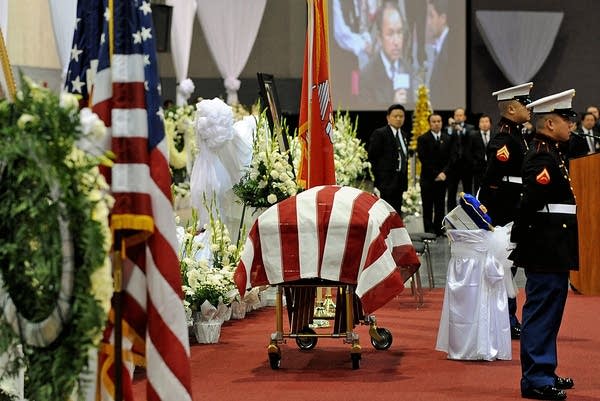Mourners salute Hmong leader Vang Pao; Army denies Arlington burial
Go Deeper.
Create an account or log in to save stories.
Like this?
Thanks for liking this story! We have added it to a list of your favorite stories.

GARANCE BURKE, Associated Press
FRESNO, Calif. (AP) -- A horse-drawn carriage holding the body of the late Gen. Vang Pao passed thousands of sobbing mourners in military uniform and traditional Hmong dress Friday, as crowds gathered in downtown Fresno to begin an elaborate, six-day funeral service.
On the same day, the Army denied a request that Vang Pao be buried at Arlington National Cemetery.
Vang Pao's large extended family -- including his 25 surviving children -- as well as the former CIA officials who recruited him to lead a secret army during the Vietnam War followed his flag-draped casket.
Turn Up Your Support
MPR News helps you turn down the noise and build shared understanding. Turn up your support for this public resource and keep trusted journalism accessible to all.
Once the casket was lowered, a veterans' color guard saluted and bagpipes sounded as a flight team flew over the mourners.
The general died at age 81 on Jan. 6 near Fresno, and is revered as a leader and father figure by the Hmong and Lao people he helped to resettle across the globe once Saigon fell. Vang Pao, who commanded CIA-funded guerrillas in the jungles of Laos, died at age 81 on Jan. 6 near Fresno.
Late Friday afternoon, the Army announced it has denied a request to bury Vang Pao at Arlington National Cemetery.

Army spokesman Gary Tallman said Friday a board comprised of senior military and civilian officials reviewed the request and unanimously declined to grant a burial waiver.
Reps. Jim Costa and Dennis Cardoza of California had submitted the request shortly after Vang Pao's Jan. 6 death, saying the general had earned the honor of being buried alongside American soldiers.
"There will not be anyone like Father anymore because he was truly a godsend," said Chai Vang, one of the general's 32 children. "All we can do is unite the community and form partnerships around the world to carry out the work he began."
Fresno, a city of about half a million in the state's agricultural heartland, has pulled out all the stops for the ceremony, and local businesses are gearing up to supply travelers with food, sell them commemorative buttons and take part in the historic gathering of the clans.
Friday afternoon, Hmong spiritual guides and funeral specialists will burn incense, chant songs, and play bamboo wind instruments to lead Vang Pao's soul back to his childhood home in Longhay, Laos, where his spirit can don the placental jacket it will wear on its journey toward reincarnation.

On Saturday morning, his family will present chicken, rice, drinks and paper money for the general's voyage into the afterlife. His relatives will then cook and serve food to funeral guests, making hot meals of the animals sacrificed in his honor in tents outside the convention center.
Thong Chai, who manages a Hmong grocery store on Fresno's gritty east side, said his family has donated a whole pig to the general's family in recent weeks.
"The general is like a hero for us, and we've got to help his family because it's hard to provide all this food for everyone who's coming," he said, looking over the pallets of coconut juice and white gourd beverage he was preparing to send along.
For those who fought alongside the general in the Vietnam War and came to America thanks to his advocacy, Vang Pao's death leaves many issues unresolved.
Once Saigon fell, thousands of his soldiers languished in refugee camps in Thailand until they were granted refugee status in the U.S., including about 30,000 Laotians, Cambodians and Hmong who moved to Fresno.

Then, in 2007, Vang Pao and 11 others were accused of plotting to violently overthrow the communist government of Laos, sparking a 3½ year legal battle that reverberated with the last echoes of the war. Vang Pao was dropped from the case in 2009, and federal prosecutors suddenly dismissed all remaining charges last month "in the interests of justice," only days after the general's passing.
Mai Der Vang, a Hmong-American writer in Fresno, said it wasn't until she studied the general's role in the war that she understood the immense cultural and economic changes her family had experienced.
"It really allowed me to see why my parents worked so hard to ensure that I had a good education," said Vang, 29. "This war still haunts our elders and is something that still brings back very sad memories for people, so all that is coming up now."
Bill Lair, who headed the CIA's paramilitary operations in Laos and recruited Vang Pao, was expected to attend, as were several other retired CIA agents and military officials.
Earlier this week, a phalanx of the general's former recruits lined up in their fatigues to lay a wreath of yellow daisies before Vang Pao's portrait, which lay against a solemn monument to Laotian veterans on the lawn before the county courthouse.
Most were well into their 60s, but the aging secret army still snapped to attention as their former commanders cried out in Hmong for them to salute in unison.
"We fought in the American war, and if we didn't join that war there might be thousands more Americans dead," said Col. Wangyee Vang, president of the nonprofit Lao Veterans of America. "General Vang Pao wished to be buried at Arlington and we hope the U.S. will grant him that honor."
(Copyright 2011 by The Associated Press. All Rights Reserved.)



